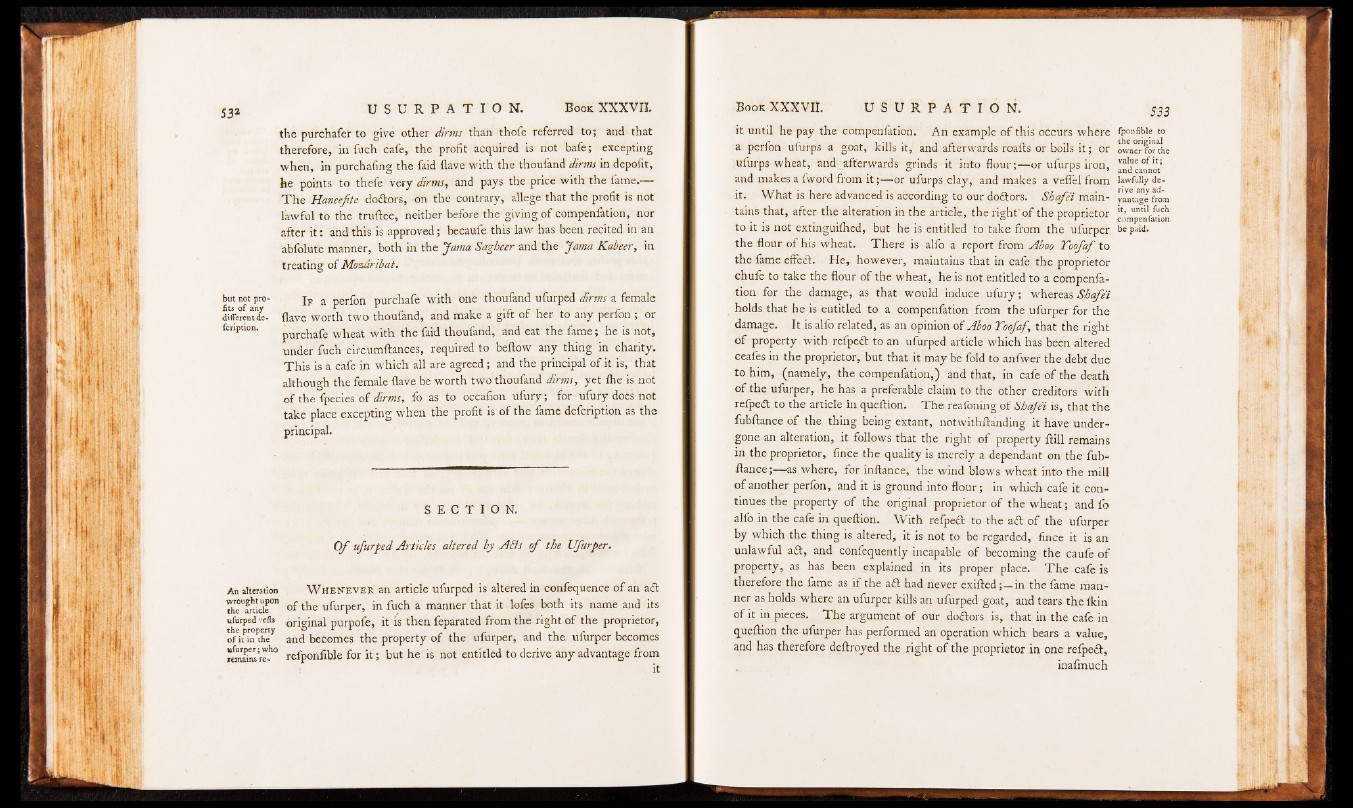
the purchafer to give other dirms than thofe referred to; and that
therefore, in fuch cafe, the profit acquired is not bafe; excepting
when, in purchafing the faid Have with the thoufand dirms in depofit,
he points to thefe very dirms, and pays the price with the fame.—
T h e Haneefte doctors, on the contrary, allege that the profit is not
lawful to the truftee, neither before the giving of compenfation, nor
after i t : and this is approved; becaufe this law has been recited in an
abfolute manner, both in the Jama Sagheer and the Jama Kabeer, in
treating of Mo%dribat.
but not pro- j F a perfon purchafe with one thoufand ufurped dirms a female
diferenTde- {lave worth two thoufand, and make a gift of her to any perfon ; or
fcnption. purchafe wheat with the faid thoufand, and eat the fame; he is not,
under fuch circumftances, required to beftow any thing in charity.
This is a cafe in which all are agreed; and the principal of it is, that
although the female (lave be worth two thoufand dirms, yet fhe is not
o f the fpecies of dirms, fo as to occafion ufury; for ufury does not
take place excepting when the profit is of the fame defcription as the
principal.
S E C T I O N .
O f ufurped Articles altered by A bis o f the Ufurper.
An alteration W henever an article ufurped is altered in confequence of an aft
rheUa«'de°n of the ufurper, in fuch a manner that it lofes both its name and its
ufurped vefts orjginal purpofe, it is then feparated from the right of the proprietor,
o n tPinPthey and becomes the property of the ufurper, and the ufurper becomes
refponfible for it ; but he is not entitled to derive any advantage from
it until he pay the compenfation. An example of this occurs where fponfible to
a perfon ufurps a goat, kills it, and afterwards roafts or boils i t ; or owner forfhe
ufurps wheat, and-afterwards grinds it into flour;— or ufurps iron, vaI"eof,‘ ;
and makes a fword from it;— or ufurps clay, and makes a veflel from lawfully de-
it. What is here advanced is according to our doftors. Shafei main- rentage from
tains that, after the alteration in the article, the right'of the proprietor untiI(.r,;ch . . . . ° r r compeniation
to it is not extinguifhed, but he is entitled to take from the ufurper be paid,
the flour of his wheat. There is alfo a report from Aboo Toofaf to
the fame effeft. He, however, maintains that in cafe the proprietor
chufe to take the flour of the wheat, he is not entitled to a compenfation
for the damage, as that would induce ufury; whereas Shafei
holds that he is entitled to a compenfation from the ufurper for the
damage. It is alfo related, as an opinion of Aboo Toofaf, that the right
o f property with refpeft to an ufurped article which has been altered
ceafes in the proprietor, but that it may be fold to anfwer the debt due
to him, (namely, the compenfation,) and that, in cafe of the death
of the ufurper, he has a preferable claim to the other creditors with
refpeft to the article in queftion. The reafoning of Shafei is, that the
fubftance of the thing being extant, notwithftanding it have undergone
an alteration, it follows that the right of property ftill remains
in the proprietor, fince the quality is merely a dependant on the fubftance
;—ras where, for inftance, the wind blows wheat into the mill
o f another perfon, and it is ground into flour; in which cafe it continues
the property of the original proprietor o f the wheat; and fo
alfo in the cafo in queftion. With refpeft to the aft o f the ufurper
by which the thing is altered, it is not to be regarded, fince it is an
unlawful aft, and confequently incapable of becoming the caufo of
property, as has been explained in its proper place. T h e cafe is
therefore the fame as if the aft had never exifted;—in the fame manner
as holds where an ufurper kills an ufurped goat, and tears the fkin
of it in pieces. The argument of our doftors is, that in the cafe in
queftion the ufurper has performed an operation which bears a value,
and has therefore deftroyed the right of the proprietor in one refpeft,
inafmuch